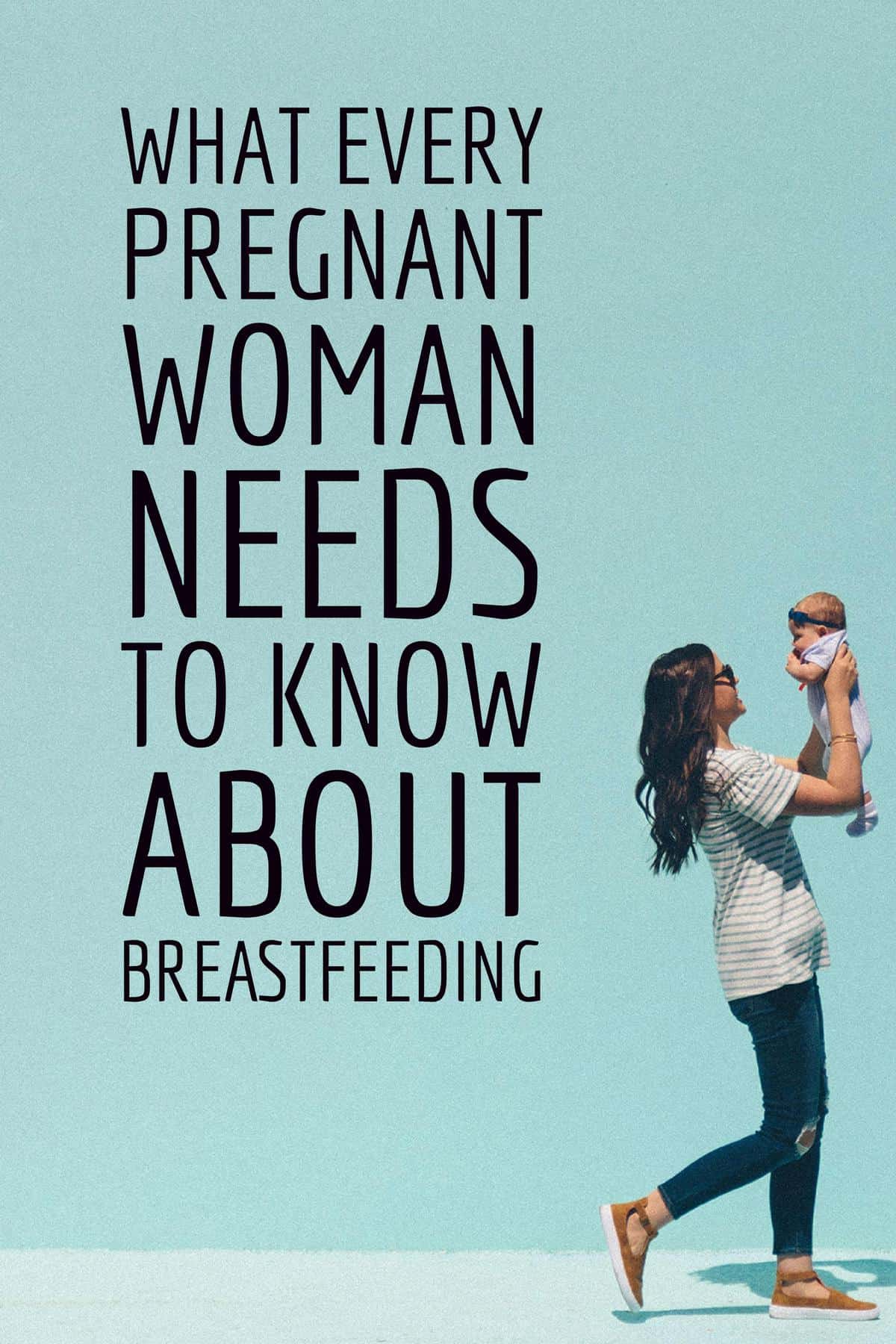
This is breastfeeding 101! Your pregnancy is a great opportunity to prepare yourself and maximize your breastfeeding success. Learn from a breastfeeding expert, and hear from experienced moms who wish they knew this before they started breastfeeding. Read part 2 here and part 3!
[x_blockquote cite=” Dr. Jack Newman” type=”left”]”The problem with breastfeeding is not a problem of trying to motivate mothers so that they want to breastfeed. The problem with breastfeeding is how to prevent mothers from being disappointed in a situation when they desired to breastfeed but were faced with difficulties and obstacles or were told that in their situation they “cannot” breastfeed even though they wanted to.” [/x_blockquote]
On the surface it seems like breastfeeding should be simple. Moms make milk, babies drink that milk. End of story, right?
Well, I have a 3″ textbook that’s dedicated to breastfeeding! It covers a lot. Sometimes breastfeeding is simple, but sometimes it gets complicated! The best way to prepare yourself is to learn about some of the more common situations and challenges.
Hearing the breastfeeding stories
When I was pregnant I read every birth story I could. Since each one is unique, and the process of labouring is not always textbook, I wanted to prepare myself by hearing as many stories as possible! Some birth stories were beautiful and awe-inspiring, while others were tinged with sadness as things didn’t go as the mother had hoped. But each story was valuable. It was helpful to hear the good, the bad, and everything in between.
It should be the same way for breastfeeding! We need to share our stories… to learn from one another. We need to hear the good, the bad, and everything in between!
So, while researching this article, I put out a call to mothers who had intended on breastfeeding, even if it hadn’t become a reality for them. I asked them for their stories and what specific things they wished they had known about breastfeeding before they birthed their babies. I’ve included these stories in each section, so you can hear what they want you to know, to have the best chance for success!
Without further ado, here are 10 things every pregnant woman should know about breastfeeding!
1) Like all relationships, each breastfeeding relationship is unique
Breastfeeding isn’t just a way of feeding a baby. It’s a type of relationship! The breastfeeding relationship you form with each child will be different and completely unique!
Think of breastfeeding as a dance: each partner has their role to play. Sometimes you’re in sync and you feel as though you’re gliding. Sometimes you feel like you’re stepping on each others’ feet! But you and your baby will move along together to find your own unique positioning and rhythm.
“I wish I had really understood that it was a skill that both of you had to learn and having support lined up is really helpful.” – Kim
“I wish I knew that just because I breastfed baby #1 for 21 months, didn’t mean that I wouldn’t have issues breastfeeding my second. I had done it before but my baby hadn’t, she still had to learn how to breastfeed and I needed to learn to breastfeed her.” – Lisa

2) Breastfeeding is natural, but it’s also a learned behaviour
When I first learned about breastfeeding difficulties, I remember being surprised and thinking “isn’t breastfeeding a natural instinct?” In the absence of medical challenges, I didn’t understand why the baby didn’t just feed automatically.
Since then I’ve had a lot more interaction with new moms (in both my friend circles and from working in public health). I’ve since realized how normal it is to have breastfeeding challenges!
This is partly because breastfeeding is a learned skill. Yes, a baby is born with several instincts that help them to breastfeed, but it’s still a skill that both mom and baby need to learn.
A good analogy is walking. It’s very natural for humans to walk. We have the anatomy and biomechanics to be able to walk on two feet, but we still have to learn how to do it! It takes practice, and we fall a lot while we learn!
One way that babies learn how to walk is by mimicking those around them. It’s the same with breastfeeding! We need to know about and see other women nursing their babies.
I heard the following story during my lactation consultant course and it stuck with me:
At a zoo there was a lone female chimpanzee. The zoo people decided to have her mated. As a result, she became pregnant and birthed a healthy baby chimp. The zoo keepers watched and expected her to nurse her baby. But she never did! Eventually the zoo keepers had to take the baby and feed it with a bottle.
A while later they decided to mate the chimpanzee again. But the zoo keepers wanted her to nurse her baby, so they tried something new. While the chimpanzee was pregnant they would bring lactating human moms and ask them to breastfeed in front of the chimpanzee. This time, when the baby was born, the chimpanzee knew what to do and put the baby to her breast!
In traditional cultures women are given a “lying in” period of 40 days to spend exclusively with their newborn baby. Someone else looks after any older children, and the mother is relieved of any duties such as cooking or cleaning. Her time is dedicated 100% to the newborn baby!
Historically, people have recognized that breastfeeding takes time to establish. It’s good to know this ahead of time and expect there to be a bit of a learning curve!
“I wish someone told me it is a skill that both you and babe learn….there is nothing [“automatic”] about it!” – Jen
“I wish I had known that….. it really is a learning curve, takes a lot of time, especially until their little mouths grow a bit, and that each baby is different!” -Alicia
“I wish I had known that while breastfeeding is natural in itself, the process of it doesn’t always come completely natural to baby, or mom. While establishing myself as a new mom, establishing my relationship with my new baby, I also had to establish our breastfeeding relationship. With some guidance from a lactation consultant, help from my mom, patience and time we were able to establish that relationship and continue on for the first full year of my daughter’s life.” -Laurel

3) It might feel awkward at first
The first time I sat behind the wheel of a car, I couldn’t believe how strange and awkward it felt! I had to do different things with each foot, shift with the right hand, and then SOMETIMES I HAD TO TURN MY WHOLE HEAD AROUND AND LOOK BEHIND ME!
Without letting go of the steering wheel or letting my foot off the gas pedal!
I had spent my whole life watching my parents drive, but it felt unbelievably foreign when it was my turn to give it a go.
This is what breastfeeding can be like. It’s something totally new that you’ve never done before!
Kathryn Baecht goes into this in humorous detail in “how to latch your baby to your left breast in a cross cradle hold in 33 easy-to-master steps.”
While it’s good to be aware of the potential awkwardness (and laugh at it), there’s something you can do to make it easier.. learn to hand express BEFORE your baby is born!
Once baby is born, you will be touching and squishing your breasts more than you ever have before! It’s a good idea to become more comfortable with that beforehand. And what better way than to practice a technique that will come in “handy” for feeding your baby!
So get the hang of this technique. You can safely start to practice this at week 37.
Hand expression 101:
- Take your thumb and forefinger and form a “C”
- Take that “C” and place it on your breast, about an inch away from your areola.
- With your hand on your breast push your hand straight back towards your chest wall.
- Now roll your fingers towards your nipple. This is kind of like what you would do if you were squeezing the last little bits of toothpaste out of the tube.
- After a few rolls you should see a few beads of colustrum expressed! It may take some practice though!

4) Seek help ASAP! Connect with breastfeeding support while you’re still pregnant
You will probably do a lot of reading and research into preparing yourself for labour and delivery. Put just as much effort into learning about breastfeeding and the supports available to you!
I don’t want to sound alarmist or put anyone into a panic, but the first 2-3 weeks are very important for building up your milk supply. If things aren’t going smoothly or you have any concerns at all, don’t be afraid to ask for help!
While you’re pregnant, do a bit of research. What kind of help is available to you locally? For example, in our city there are:
- breastfeeding clinics around the city on each day of the work week
- public health nurses and midwives who can make home visits (although not all of them have specialized training in breastfeeding
- La Leche League groups that meet about once a month
- services like a breastfeeding hotline or paid private breastfeeding help
Feel free to ask your health professional (for example the labour and delivery nurse in the hospital) about their education in breastfeeding.
Make a plan! You probably know already who will be with you for the delivery, but have you decided who you will share your breastfeeding journey with? There will be ups and downs, and it’s good to have a support network to help you!
Include both professional and personal relationships in your support network. Make sure you can call on a good friend or relative who will be willing to listen to your breastfeeding journey.
“Some of the best advice I received (from my midwife) was to spend just as much time reading up on breastfeeding and what to expect as I did reading about birth. I felt well-informed for the journey ahead. I also attended a breastfeeding support group before having my daughter and then became part of that community afterwards.” – Lindsay from Prince George, BC
” I had a midwife for both of my deliveries. One of the biggest benefits are the long prenatal appointments where she prepared me and the postpartum home visits where I could ask (and show!) her anything! I was also one of the last in my social circle to have kids. I am so grateful that my friends talked about all the good and bad that come with labour, delivery, breastfeeding and postpartum bowel movements (yes, even those). So, I felt quite prepared to breastfeed when the time came.” – Lindsay from Saskatchewan
“With my second, I hired a private lactation consultant (who comes to your home!) near the end of my pregnancy so I knew I had someone to call if I had issues again. That made all the difference, and because of it, we were able to establish a good breastfeeding relationship right from the start.” -Kelsey
” I would have wished I’d known that most (yes, most) health care professionals actually don’t know much about assisting mothers with breastfeeding. They only have their best guesses, and there is a lot of misinformation out there, even (and especially) among doctors and nurses. It’s really important to know as much as possible about what a good latch looks like, and how to tell if your baby is drinking. It’s important to know risk factors for breastfeeding success or lack of success. And it’s important to take EVERYTHING health care practitioners say with a grain of salt, don’t hesitate to get a second or third opinion, and to trust your gut.” – Carmen
” I wish I’d known sooner about breastfeeding clinics and as much as I didn’t feel I could leave the house with baby how I shoulda gone earlier. I also wish I’d known that supplementing with a bottle would not mean the end of my breastfeeding – if breastfeeding is an issue and your baby is losing weight it doesn’t mean you won’t be able to breastfeed. We gave a bottle for a 24 hr period (while first trying to feed) and it got her back on track for weight before starting with an SNS (supplementary nursing system) again and I felt sooo awful about it, yet it relieved stress and then later on we still had to pump and supplement for awhile before exclusive breastfeeding and it was all worth it!” -Cheryl from Winnipeg
” I wish I took better advantage of nursing clinics in the city, and felt less pressure to downplay the struggle!” -Kimberly
“I was successful at breastfeeding my sons each for about 9 months. However, what I wish I had known or what I would strongly advise other moms with the intentions of breastfeeding is to get help AS SOON AS YOU CAN if you are having troubles. My youngest son would feed efficiently but when he unlatched he pulled hard on my nipple and within hours I was chapped. The lactation consultant in the hospital was able to see me immediately and gave me some techniques to try which immediately remedied the situation such that I was able to breastfeed him easily and successfully” – Heather from Ontario
“Everyone experiences problems in some form over their breastfeeding journey and it’s important to have resources set up BEFORE those problems happen. These being a breastfeeding support person in the community like a le leche league leader or other, friend or family members who have successfully breastfed and will validate and support you, professional supports in the community and then ‘reputable’ websites online or books. I can’t believe how many bumps in the road we have overcome together.
I’m not sure what would have happened without the support people i reached out to when i needed them.” – Amy from Prince George, BC
“I wish I knew beforehand how and where to find good lactation consultants in my community.” – Leslie
“The one place I ended up getting so much support, was from the La Leche League. I had heard, while pregnant, that they were extreme breastfeeding advocates who would push you to nurse, no matter what. After one meeting, I realized that this was the furthest thing from reality.” – Kate from Winnipeg

5) You will probably have enough milk to feed your baby
The most common reason a mother will stop breastfeeding is the perceived lack of milk. I emphasize ‘perceived’ because most women CAN make enough milk to feed their babies exclusively!
Of course, some adjustments might need to be made, but you should feel empowered! There’s no need to fear that you won’t be able to make enough milk for your baby!
Medical conditions such as PCOS, thyroid dysfunction, Raynaud’s syndrome, or a history of breast surgery could mean that you might have more of a challenge making enough milk. In order to prepare yourself, ask your prenatal provider whether there’s any medical reason why you may not be able to create an adequate supply.
Here are some common reasons why a mom may not be making enough milk:
- Not feeding often or long enough. Before I took my breastfeeding course I had the impression that babies need to feed every 3 hours and that each feed shouldn’t take more than 15 minutes. As it turns out, that’s leftover ideology from bottle feeding norms. There isn’t really a “normal” when it comes to breastfeeding! Let’s say you need to drink 8 cups of water a day. You could use a 1 cup glass and refill it 8 times. Or you could use a 1/2 cup glass and refill it 16 times. Or you could use a 2 cup glass and refill it 4 times. In each scenario you’re always getting 8 cups of water a day. It’s the same with breastfeeding! Some women have a larger supply of milk that they can keep in their breasts at one time. Others have a smaller supply and those babies need to drink more frequently in order to get enough milk around the clock. And no, your milk “cup” isn’t correlated with your bra cup size! You can’t assume that a women with large breasts will then have a large cup of milk inside.
- Not having a good latch. Your baby’s latch is KEY to a lot of things, one of which is making enough milk! When the baby is latched on well and milk is transferring well, then the mother’s body responds by making more milk. Dr. Jack Newman is a pediatrician who has an amazing clinic in Toronto, Ontario, and has helped countless women achieve success when faced with breastfeeding obstacles. His website is a fountain of knowledge for women to know whether their babies are latched on well. His info is so helpful. In fact, it’s a good idea to follow him on FB and read his posts! You’ll be well informed about latching!
- Baby having a tongue/lip tie. This is one significant reason a baby may not have a good latch. It’s worth mentioning because so many women have waited so long before their babies were finally diagnosed (which requires a qualified expert). While a baby is developing in the womb the tongue should separate from the skin of the mouth, but this doesn’t always happen completely. While a baby is breastfeeding it needs to be able to stick its tongue out of its mouth to get a good latch. If the tongue is still “tied back” the latch will be affected.
So as you can see, there are several things that can be done to ensure your baby is getting enough milk from you! This list is not exhaustive. If breastfeeding is important to you, please know that you can get help to figure out if a slight adjustment, such as correcting a latch, could help you make more milk! You don’t need to assume that you simply don’t have enough milk!
And if you’re somebody who just could not make enough milk, I am so so sorry this was the case for you. I am, in no way, wanting to make a mother feel bad for her breastfeeding experience. I’ve hesitated to write on this subject, because while proper breastfeeding knowledge is critical, I don’t want anyone to feel shame for not breastfeeding.
So let’s clear some things up:
- yes, some women simply don’t make enough milk (a diagnosis called insufficient glandular tissue) but this is more rare than women are led to believe.
- this is not caused by a lack of trying! If effort was the only thing we needed to make enough milk then I don’t think there would be a woman on earth who didn’t have an adequate supply! Part of the problem is that, unfortunately, a lot of women receive bad breastfeeding help.
- for various reasons, women are often taught to hate or mistrust their bodies. This spills over into one’s breastfeeding experience and these internalized messages can lead a woman to feel defeated rather quickly and simply feel as though her body is letting her down once again. I want women to feel empowered about the amazing things their bodies are capable of doing!
“I wish I’d known about lip and tongue ties and how they can impair a baby’s ability to remove milk from the breast, thus affecting milk supply. With my first, I had a “low supply” that was treated with domperidone for 9 months, which seemed to help but I did still have to supplement with formula and pump often. He was (much later) diagnosed with a significant tongue tie but by then, breastfeeding was well established and he was already on solids so I didn’t think it mattered.” – Danielle
“I wish I had known how common breastfeeding problems are. I didn’t for a second think that I would have any issues as most women in my family nursed and got along just fine.” – Bethany from PEI
“I loved breastfeeding but wish I knew that, yes, there can be pain. From painful latching until you and babe figure out what you’re doing to crazy toe curling after birth pains whenever you nurse for the first week. Everyone always says there’s no pain if you’re doing it right, but for me and friends, there is at the beginning. And please seek out support if you’re struggling. And if it’s not working, don’t feel guilted by anyone if you don’t nurse.” – Liesel from Red Deer, Alberta
Keep reading for Part 2 and Part 3!
[share title=”Share This Article” facebook=”true” twitter=”true” google_plus=”true” linkedin=”true” pinterest=”true” reddit=”true” email=”true”]


What a great article Jessica! So important to be informed during pregnancy. You’ve chased the myths with facts and you help moms hop over the barriers to breastfeeding.
Hey Bridget! Thanks for the feedback!